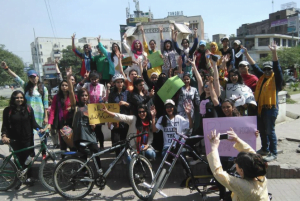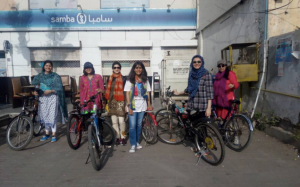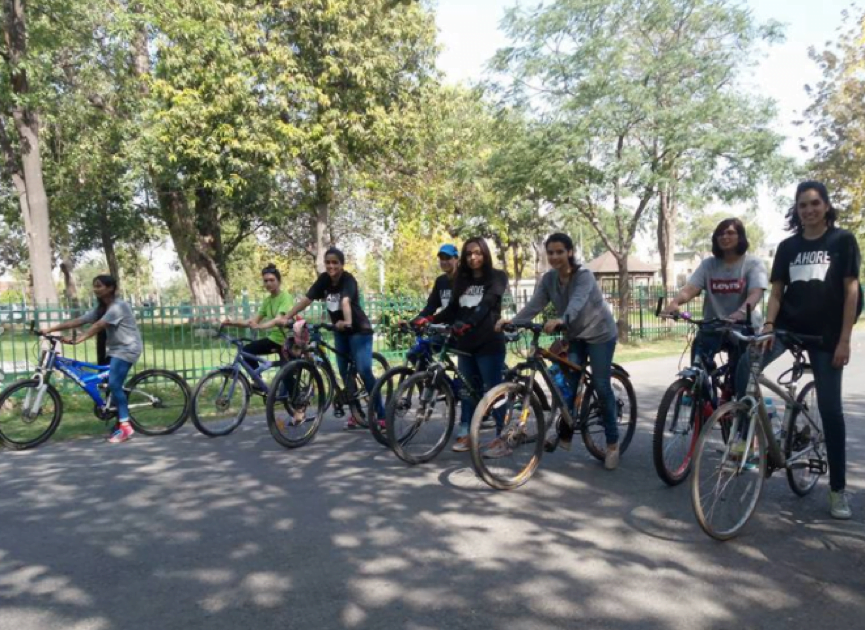The “Girls On Bikes” initiative began when Aneeqa Ali, a girl from Lahore who is a part of the cycling group Critical Mass Lahore, was harassed, followed, and beaten up by a couple of men while she was out cycling on the road in March 2016. Critical Mass is a group that cycles around the city on a weekly basis.
Noor Rahman, also a member of Critical Mass, commenced it in 2016 as a response to the incident. She created a women-only group on Facebook Girls On Bikes – Lahore where she coordinates and manages rides with girls. The protest was exclusive to females; however, a lot of men showed up to show their support as well, which was great. So on this fine day, people took to the streets cycled around the Gulberg area and chanted out slogans like “cycle chalao, patriarchy dubao!” (“ride cycles, drown the patriarchy!”) as an attempt to show solidarity with Aneeqa and to reclaim what was theirs – the streets.

The protest march by Girls On Bikes.
When I first heard about the incident on social media, I was enraged. I pondered over how exactly one could prevent this anomaly from happening again. A few days later, I heard of the bike rally being organised in protest. I decided to join the protest and consequentially found more about Girls On Bikes and became a part of the group.
This protest and the following bike rides I participated in were important to me on a personal level. As a child I had wanted to be a cyclist, so aside from the protest, I was thrilled at the idea of hitting the streets with a cycle, and that too with good company. I used to ride my cycle ever since I was 4 and carried on doing so until I was 13. I now try to wrap my head around what exactly made me stop. What was it that all of a sudden confined me to my house? Puberty? Why was it suddenly unacceptable for a teenage girl to be outside her house having fun with friends and siblings? Was it deviant? It seemed like it, considering I had seen no girl my age around me do the same – go out, reclaim the streets, and continue doing what she loved to do.
This protest held in support of Aneeqa was my return to cycling since after moving to another city I now had a lot more exposure and freedom to use my agency to do what I wanted. It was impossible to stop me then, even though my parents called me up and told me what every Pakistani girl hears every now and then: “We trust you but we don’t trust the society,” and, “You have good intentions but people around are intolerant and don’t always have the best of intentions”. While I understood where they were coming from, that was not enough to hold me back.

Girls on Bikes, Lahore.
Cycling, to me, was and is everything. When the wind gushes against your face as you pedal on and go to places you wouldn’t otherwise go, that feeling is inexpressible. I was glad to see people supporting the idea of women reclaiming the streets. It made me feel great because it made me realise that stopping something you are passionate about just because society doesn’t approve is a big mistake. Cycling the streets that day almost made me feel like a low-key rebel.
It’s a risk, yes, and there may be harassers and molesters out in the open, but to me, it’s a risk that is necessary to take. It’s high time to normalise the presence of women in public places, laughing, loitering, gesticulating, and having the time of their lives. It is not acceptable for something like gender, which in itself is a social and cultural construct, to hold people back and stop them from having a good time, or just owning the streets and walking or cycling to work, etc.
Also Read: “Cycle Waali Chhori” – New Chapters In Loitering & Street Harassment
Following that first time, I regularly started going out and would often find little boys on the roads, but when it came to girls there were very few and almost always, none. My parents slowly got used to the idea as well, and that’s what the aim was – to normalise it to the extent that the mere act of a woman occupying public space stops being such a deviant and unacceptable activity in society. It’s amazing to continue cycling along with a group of girls and getting to know them while exploring different parts of the city.
It took me time but I managed to explain to my parents why it wasn’t just important for me at a personal level, but also on a social level in the sense that by being out there in places we aren’t “supposed” to be we try to transcend the barriers that society has created for us. While making such decisions about my mobility I am also deeply aware of my 2-year-old niece who would grow up in a similar society. For the sake of her and other generations of girls to follow, I want there to be people out there who can claim that they didn’t stop doing something that they loved just because society told them to do so, and I plan on being one of them.
Who even decided to confine women to the private sphere in the first place? Who decided it was a good idea to restrict women’s mobility and then justify it on the basis of “fear” or “safety”? These are important questions to ask because they shape the lives of many women in South Asia. Access to public spaces is the fundamental right of women and Girls on Bikes is doing a great job at fighting for that right and trying to change social attitudes towards women being in public spaces one pedal at a time!
About the author(s)
Maryam is an aspiring sociologist who is keen on working on of gender, advocates an intersectional feminism and is hopeful of smashing the patriarchy.




